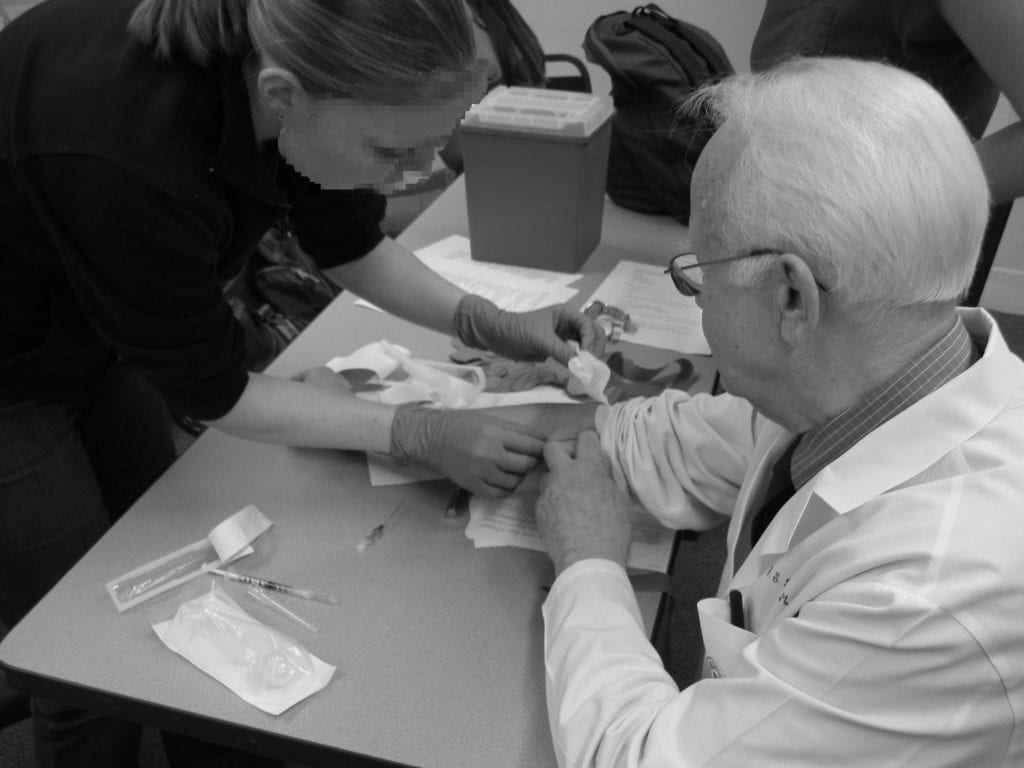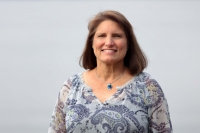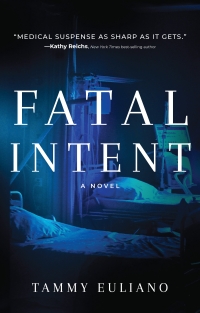An Unseen Border
Published in Hektoen International: A Journal of Medical Humanities
 “Please let me have the chest pain in 3,” I said. “I can’t take any more whiny kids today.”
“Please let me have the chest pain in 3,” I said. “I can’t take any more whiny kids today.”
Clare raised an eyebrow.
“You can have the next trauma.”
“Two traumas,” she said. “I can’t stand any more whiny parents.”
“Deal.”
She wrote my initials by Room 3. “Remind me why we chose Emergency Medicine?”
My sentiments exactly. One month into internship and boredom exceeded thrill by a large margin. We wanted to learn about emergencies but so far had been relegated to the easiest cases.
In Room 3 I found a large man on the gurney. His white dress shirt was partially unbuttoned and multi-colored ECG leads snaked through in all directions. His face appeared relaxed, but his eyes—far from it. A woman stood, holding his hand, concern etched in the lines of her care-worn face. Her red dress contrasted sharply with the institutional green walls and cabinets.
“Mr. Toten?” I said.
He nodded and gestured to the woman. “My wife.”
“I’m Dr. Jill Warren. Tell me what’s going on.” I typed my note as he spoke:
7/25/17 70-year-old black male presents with acute-onset chest pain during church.
The questions came mechanically, the answers expounded upon by his wife.
Until he stopped answering.
“Jared?” His wife grabbed his shoulders. His head lolled.
I reached for his neck—no pulse. Alarms blared as the monitor traced an abnormally wide ECG.
The door flew open and several staff ran in. “V-Tach,” I said. “Starting chest compressions.” His chest was stiffer than training manikins. I probed my brain for the treatment protocol, but the next step remained just out of reach.
The wife’s anguished sobs faded as she was escorted from the room.
“Charge the defibrillator,” said Dr. McCall, the senior resident. “Epinephrine one-milligram.”
“Clear!” He held up the paddles, waiting for me to back away.
KA-THUNK. The patient’s chest jerked.
“Resume CPR,” Dr. McCall said.
As I did, I watched the ECG. First one blip, then another, normal sinus rhythm.
“Pulse check.”
I pressed two fingers to the patient’s neck and smiled.
Mr. Toten’s eyes opened, staring directly into mine, an enigmatic expression that filled my heart with lead.
“My wife—” Then his eyes rolled back and the alarms sounded again.
“V-Tach,” Dr. McCall said. “Resume chest compressions.”
A nurse sprang to action in my place, my brain in slow motion . . . those eyes . . .
Another shock and the pulse returned. His lids fluttered open. “My wife . . . please.” And then he was gone again, slipping back and forth across the unseen border.
“Let’s get her.” A hand on my shoulder steered me toward the door, but this was my first chance to intubate a real person. Then I saw the white coat, the white hair, the piercing blue eyes of understanding and censure in equal measure. I could not argue with a senior attending, even one I had never met. “Dr. Gravenstein” according to his lab coat worn over shirt and tie. “Mrs. Toten met you. You must tell her he is dying.”
“But he’s not—”
He shook his head.
In the waiting room, through a sea of suits and dresses, hers was the only red.
“Mrs. Toten, come with me, please.” I led her to a small room. “Your husband’s heart isn’t responding to treatment.”
“I want to see him.”
Dr. Gravenstein nodded from the doorway. During a code? But I could not argue with seniority. I led her back to his room, but slipped in alone first. “His wife is here.”
“Clear!”
The patient jerked with the clunk of the defibrillator.
“Bring her in,” Dr. McCall said.
As I opened the door, she rushed to the bedside. The staff backed away.
“Tell the kids I love them,” Mr. Toten said softly.
She lifted his hand and kissed his palm with a tenderness too intimate for onlookers.
“Have the party,” he said. “Celebrate our life together.”
She sobbed. “I love you, always.”
The alarm blared, but the nurse silenced it and no one moved. Mr. Toten’s eyes drifted closed.
His wife caressed his face, kissed his cheeks, his lips, then rested her head on his chest and sobbed.
Why weren’t we shocking him, doing chest compressions, bringing him back?
“Time of death, eleven forty-five,” Dr. McCall said quietly, then approached me. “He wanted only to say goodbye.” He glanced back briefly at the couple that was a couple no longer, then filed from the room with the staff, a silent parade. We would reconvene in the conference room to debrief the events—what went right, what went wrong, how to do better next time.
I moved to follow, but Dr. Gravenstein stopped me with a hand on my arm.
“The debrief—”
“Later.” He gestured to the scene.
We stood at a distance, silent observers. It felt intrusive. I needed to hear the discussion, to participate, to learn.
“Yes, you do,” he said.
I did not realize I had spoken aloud.
The sobs quieted. “Thank you, Jesus, for nearly fifty years with this wonderful man. Help us to understand why you took him home. And thank you for letting me say goodbye.”
Dr. Gravenstein nudged me forward. Mrs. Toten stood and pulled me into an embrace.
“Thank you. Thank you for bringing me in and for staying with me. You have given us a greater gift than you’ll ever know.” Dampness seeped onto my shoulder.
This woman had just lost her husband, we had failed to save him, and she was thanking me. Dampness seeped into my eyes.
“Saturday is our 50th Anniversary. He wants us to celebrate, and we will.” She took her husband’s hand again. “Can our family come in now?”
Dr. Gravenstein nodded. Dr. McCall had already shared the sad news. I brought them in. Hugs were exchanged through rivers of tears. When they began to pray, Dr. Gravenstein at last gestured to the door. He guided me to a room in a back corner of the ER. Unlabeled, I had assumed it was a maintenance closet. Instead it was a small office, windowless but cozy, with quotes stenciled on the walls. I would have read them, if not for the tears blurring my vision.
“You made a difference today.”
“He died.” I choked back a sob, adding embarrassment to failure.
“Yes.” He offered me the handkerchief from his pocket. “But so must we all.”
“I missed something, before he coded.”
“No, you didn’t. Preventing death is an imperfect goal.”
That made no sense. “We’re supposed to help people, to save lives.”
“Those are not always the same thing.” He pointed to a quote above the door, primum non nocere. First, do no harm. The Hippocratic Oath.
“How can we know?”
“That, Dr. Warren, is why it is the practice of medicine. We bring to each patient the knowledge gained from all those before.”
So all the studying and memorizing and lectures and exams, those were only the beginning. I found that strangely comforting.
“Are you ready?” he said.
I nodded.
In the conference room, the nurse stood and hugged me. “Thank you for what you did.”
Shocked, I mumbled something incoherent and took a proffered chair.
She addressed the group. “She went out of her way to follow his last wish—to say good-bye to his wife.” She wiped her nose with a tissue. “It was beautiful.”
“It wasn’t my idea,” I said. “Dr. Gravenstein—” I stopped, disconcerted by the knowing glances exchanged across the table.
“Doesn’t matter,” Dr. McCall said. “You did the right thing at the right time.”
The assignment board had since filled—abdominal pain, gunshot wound, head trauma. Clare’s initials claimed the latter. For reasons I could not explain, I chose the abdominal pain over the gunshot wound, and met the most interesting man. Jake tended horses on a ranch, a real-life cowboy. Then there was Emma, a six-year-old who liked to draw and play the piano, whose earache kept her up last night. And disheveled Jennifer, who at first denied the needle tracks in her arms. I snuck her into the call room for a shower while we waited for social services. Soccer-star Zach was explaining the illegal block that twisted his ankle when Clare called me from the room.
“I’ve had three traumas and a head wound. There’s another coming in. You can have it.” Her generous words seemed more of a boast.
“I appreciate that, but I’ll finish this one up.”
Eyebrows knit together, she said, “Too traumatized from the MI?”
I bristled at her label for Mr. Toten, a label I would have used only that morning. “No . . . I’m fine.”
And I was. I rejoined Zach and learned more about soccer than any football-loving gal deserved to know.
That night I studied the ACLS protocols until they were burned in my brain, but still I was restless. The events played over and over. I wrote a note to Dr. Gravenstein, thanking him for teaching me something I could not learn in books.
In the morning I went to Dr. Gravenstein’s office. When my knock went unanswered, I slipped the note under his door.
After a morning of straightforward cases, I went by the office again. The door stood ajar. With trepidation, I pushed it open. “Dr. Gravenstein?”
In place of his cozy office, rolls of paper products lined the left-hand wall. A cleaning cart took up most of the middle. But on the right, the wall was papered floor-to-ceiling with notes on stationery and cards and letterhead and plain paper. My note was tacked on top. Above it hung a plaque:
In Memoriam
Dr. Joachim Gravenstein, 1925-2009
Physician, teacher and mentor
Eyes of the Master. Photo by Steve Robicsek, MD/PhD. 11/6/2004. Permission granted by the artist.


